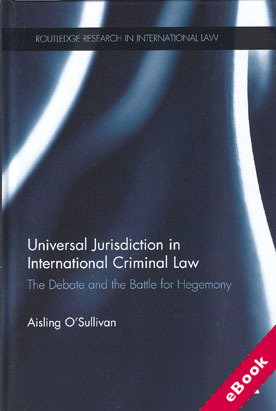
The device(s) you use to access the eBook content must be authorized with an Adobe ID before you download the product otherwise it will fail to register correctly.
For further information see https://www.wildy.com/ebook-formats
Once the order is confirmed an automated e-mail will be sent to you to allow you to download the eBook.
All eBooks are supplied firm sale and cannot be returned. If you believe there is a fault with your eBook then contact us on ebooks@wildy.com and we will help in resolving the issue. This does not affect your statutory rights.
With the sensational arrest of former Chilean dictator Augusto Pinochet in 1998, the rise to prominence of universal jurisdiction over crimes against international law seemed to be assured.
The arrest of Pinochet and the ensuing proceedings before the UK courts brought universal jurisdiction into the foreground of the "fight against impunity" and the principle was read as an important complementary mechanism for international justice -one that could offer justice to victims denied an avenue by the limited jurisdiction of international criminal tribunals.
Yet by the time of the International Court of Justice's Arrest Warrant judgment four years later, the picture looked much bleaker and the principle was being read as a potential tool for politically motivated trials.
This book explores the concept of universal jurisdiction in international criminal law through a critical international legal approach exposing the legal techniques in operation in every judgment. Drawing on the work of Martti Koskenniemi and David Kennedy the book seeks to unpack the legal arguments justifying and criticizing universal jurisdiction in the legal debate on jurisdiction and through detailed analysis of the relevant case law.
Identifying overarching patterns within the debate on universal jurisdiction, Ailing O'Sullivan argues that this debate is bounded by the tension between contrasting political preferences or approaches, labelled as moralist ("preventing impunity") and formalist ("avoiding abuse") which struggle for hegemonic control.